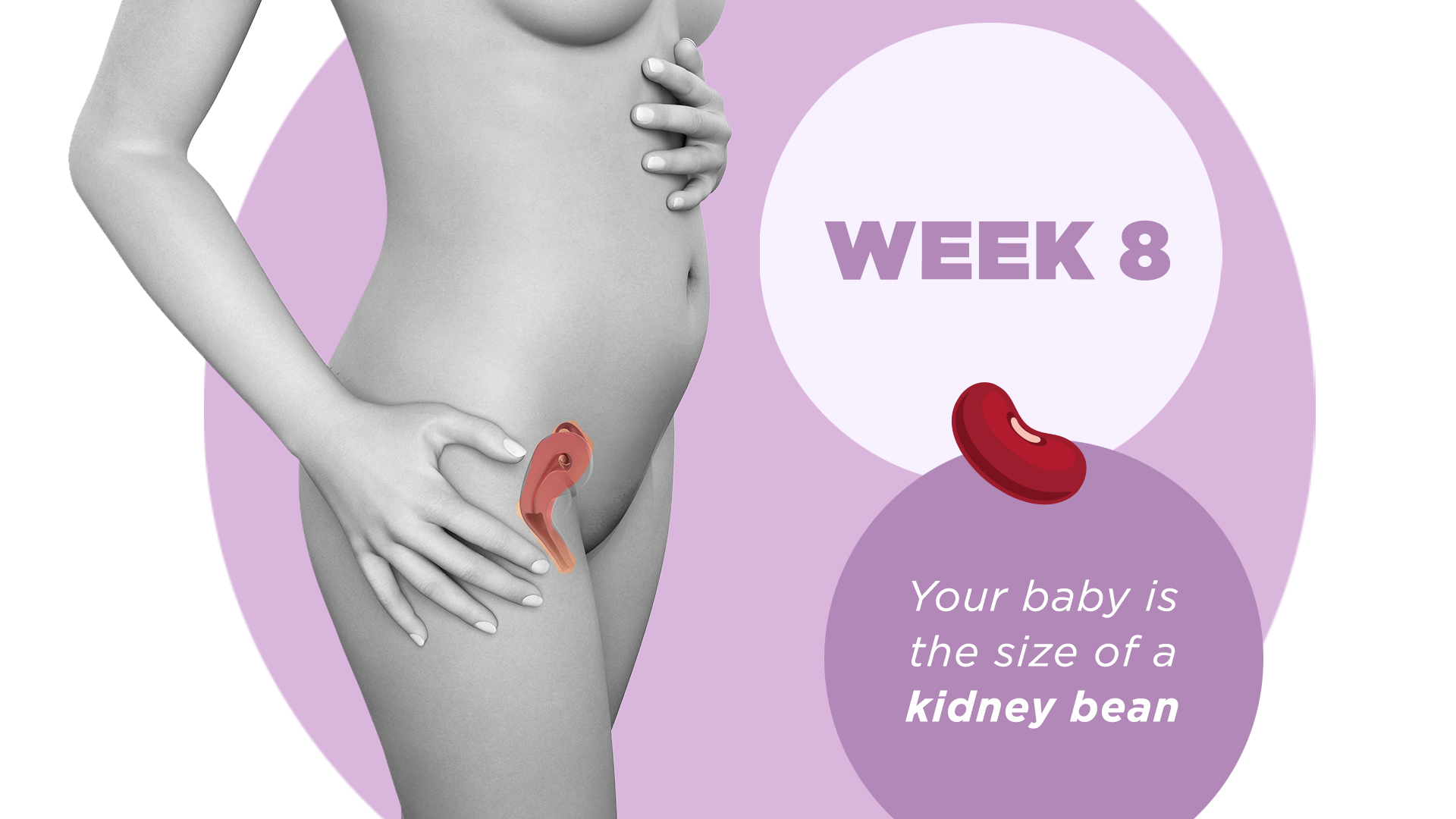8 weeks pregnant - symptoms, fetal development and what to consider
The dreaded morning sickness may take its toll when you're 8 weeks pregnant

8 weeks pregnant? This is when the tiredness and morning sickness can start to to kick in. We discuss the reasons why, and others things to consider during your eighth week of pregnancy.
Symptoms at 8 weeks pregnant
You may be feeling sick and tired as pregnancy fatigue and morning sickness take their toll. Those pesky pregnancy hormones have a lot to answer for and it's the dramatic rise in progesterone in these early weeks that is responsible for making you feel wretched.
Although morning sickness can make you feel truly dreadful, it is a normal complaint of early pregnancy and one that can usually be managed with some self-help measures. However, sometimes morning sickness becomes so severe that medical help is needed.
You should contact your GP or midwife if you are vomiting more than four times a day, you are losing weight, or you are constantly thirsty but not passing much urine. This is particularly true if you are throwing up more fluids than you are getting down as it could be a sign of dehydration. Morning sickness can sometimes mean all day sickness, but if there is a time of day when any vomiting and sickness subsides, take your pregnancy vitamin supplement then.
Fetal Development at 8 weeks pregnant
At the end of this week the embryonic period ends and the foetal period begins. Your baby's now the size of a kidney bean and is known as a 'foetus' rather than an 'embryo'. Hands and feet have fingers and toes but may still be webbed. The tadpole-like tail is completely gone, lungs have begun to form while all the organs, muscles and nerves have started to function. In fact your baby is already moving around in your womb, although it will be many weeks yet before you'll be able to feel those first flutters.

Changes to consider at 8 Weeks pregnant
All women should be offered a dating ultrasound scan between eight weeks and 14 weeks of pregnancy. The sonographer will date your pregnancy by measuring your baby from the top of his head to the bottom of his spine. In the first 12 weeks all embryos develop at the same rate, which is why your pregnancy can be accurately dated by measuring your baby's length. It's often at this first dating scan that any twin or multiple pregnancies will be detected.
Your first antenatal appointment is known as your booking-in appointment. This will be scheduled any time between eight-12 weeks. From this point onwards you're officially pregnant and will be given your own set of antenatal notes to take away with you. Your midwife will take a family medical history and will give you information about antenatal screening and diagnostic tests available. She will take your blood pressure and test a urine sample for protein and sugar.
Parenting advice, hot topics, best buys and family finance tips delivered straight to your inbox.
These routine checks will be carried out at every subsequent antenatal appointment as raised blood pressure and protein in the urine are important signs of pre-eclampsia, a potentially life-threatening condition of pregnancy. She will measure your height, weight and will take a blood sample. She may also carry out a physical examination, checking your breasts, heart and lungs. You will also be asked where you want to have your baby. (If you haven't yet made up your mind, don't worry - there's still plenty of time to make a decision.)
When you go for your booking-in appointment the blood sample taken will be tested to check your blood group and to see whether you are rhesus positive or rhesus negative. (If you are RhD negative you will be offered routine anti-D injections as part of your antenatal care at 28 weeks and 34 weeks of pregnancy.) While there are standard tests that will be carried out, there is another group of tests that will require your written consent. These include tests for HIV, Hepatitis B, syphilis and your immunity to rubella. You may also be offered a test for inherited blood disorders such as sickle cell and thalassaemia.
Further advice and information:
- Visit the NHS for more pregnancy week by week advice
- Download a pregnancy tracker app
- View all our pregnancy week by week guides
Anna Bailey has been the editor of GoodtoKnow since 2018. Before joining the team she was Features Editor at MSN UK, where she oversaw Family Health and Days Out. Previously, she was Digital Lifestyle Editor for the broadcaster UKTV, and Lifestyle Editor for ITV.com. Anna studied Multi-Media Journalism at Bournemouth University and went on to gain her NCTJ and NCE journalism qualifications. Anna is responsible for driving the direction and editorial strategy of Goodto. A mum and experienced baby product tester, she is passionate about providing safe, trustworthy, and relatable advice for families of all kinds.